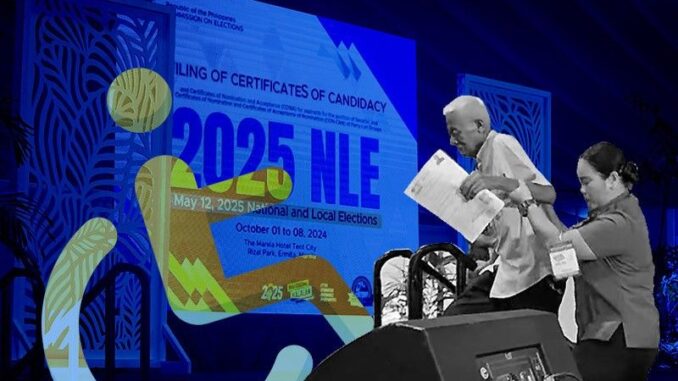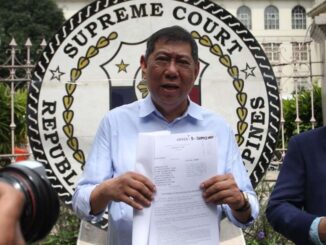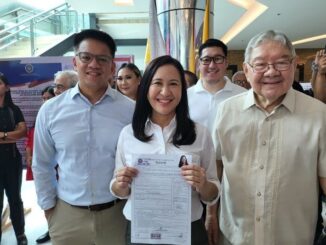
MANILA, Philippines — How easy does the government make it for persons with disabilities to file a certificate of candidacy?
Sometimes the installation of a single ramp, or the widening of a path by a couple of inches, makes all the difference.
On the first two days of the filing period for the certificates of candidacy, no wheelchair-bound aspirant for a national position showed up at the Commission on Elections’ (Comelec) venue at the Manila Hotel.
But two aspirants, both senior citizens, had visibly struggled as they climbed the steps to reach the stage where aspirants introduced themselves.
Former Comelec Commissioner Rowena Guanzon and an advocacy group championing disability inclusion told Philstar.com that the stage where aspirants present their platform and face the media has some accessibility issues, the most noticeable of which is the lack of a ramp.
Besides the absence of a lift for wheelchair access to the stage, the stairs beside the stage “may be difficult to navigate for individuals with mobility impairments,” said Bless Adriano, convenor of Kasali Tayo, a group advocating for accessibility for persons with disabilities (PWDs).
“Though there are two railings, the width of the stairs might not be wide enough,” Adriano added.
“The height of the stage could be a barrier for those who cannot use stairs. The absence of tactile indicators or contrasting colors on the stairs could make it challenging for individuals with visual impairments,” she said.
Guanzon, who went to the COC filing site on Tuesday, October 1, said it would be difficult for wheelchair-bound aspirants to get around the area. “If someone in a wheelchair files their candidacy, they’ll have a hard time because they’ll need someone to carry their wheelchair.”
“Then I don’t know if they’ll fit in the scanner [at the entrance]. And then when you go up on stage to present your programs, there’s no ramp there either,” she said in mixed Filipino and English.
Adriano said the poll body’s overall setup for the filing of national candidacies “does not appear to accommodate individuals with different accessibility needs.”
Philstar.com has reached out to Comelec for comment and will update this article with its response.
A step backward in accessibility
The accessibility of the venue was put to the test on the first and second days of the COC filing period by two older adults who bared their plans to get elected next year: the 83-year-old former Manila mayor Lito Atienza and the 70-year-old Skyway traffic enforcer Victoriano Inte.
Both aspirants were seen gripping the arms of their companions as they made their way up and down the stage for media interviews.
WATCH: Seventy-year-old traffic enforcer Victoriano Inte struggles to walk up the stairs to the Comelec’s stage after filing his certificate of candidacy for the Senate.
Staff brought up a chair to allow Inte to sit down while taking questions from the media. #COCFiling… pic.twitter.com/me5SKFG9eM
— Philstar.com (@PhilstarNews) October 2, 2024
Inclusivity starts “with the literal steps that people—especially those from marginalized communities—must take to participate in our democratic processes,” Adriano said.
The stairs, even with a metal extension that appears to be only about two feet wide, do not meet accessibility standards, the disability rights advocate said.
“It’s not enough to add a makeshift solution like this without considering the need for proper anti-slip materials or wider, more accessible ramps that could accommodate everyone safely and effectively,” she said.
“Such lapses are not merely logistical concerns; they represent barriers to the exercise of fundamental human rights and the full inclusion of persons with disabilities in society,” Adriano added.
Jean Mangaluz
Guanzon also noted the absence of a sign language interpreter for potential aspirants who lack the ability to speak.
By now, Guanzon said, interpreters should be a mainstay in all government events, especially those part of the electoral process.
“What if the candidate can’t speak? Will they use sign language then? How will the media understand what they’re saying?” she asked.
Upon arriving at the Manila Hotel, the former poll body commissioner was also disappointed after seeing no available dedicated parking slot for persons with disabilities.
“I looked around, and there were no accessible parking spaces available. There was a black SUV parked, but it might be an official vehicle,” Guanzon said. “My question is, on this day and until the last day, shouldn’t there be accessible parking for those in wheelchairs?”
Beyond polling precincts
Both Kasali Tayo and Guanzon stressed the need to make elections accessible for PWDs — not just in voting, but also in filing candidacies and expressing their capacity to lead.
While Kasali Tayo acknowledges Comelec’s efforts to comply with Republic Act 10366 and its own resolution on promoting inclusive elections through accessible polling precincts, “the right to full civic and political participation should not be limited to the right to vote.”
“It should also encompass the freedom and access to express our capacity to lead and serve our community as political leaders, change-makers, and drivers of significant decisions and programs,” the group convenor added.
It is “a lot of trouble,” Guanzon said, but placing so-called accommodations for persons who struggle to walk, require a wheelchair, or are hard of hearing is part of the poll body’s obligations.
“It’s the duty of Comelec to have universal awareness of persons with disabilities and the accessibility they need for the elections,” Guanzon said.
“Giving PWDs access to elections is not just some accommodation. It’s a right,” she added.
Kasali Tayo urged the Comelec to follow universal design principles in all its venues to ensure accessibility for individuals with diverse needs.
The poll body should also ensure there are clear signages and sufficient lighting, as well as “alternative formats and accommodations for people with different types of disabilities.”
“Let us not wait for more inconvenience or, worse, accidents to occur before taking action,” the group added.
“Now is the time to make our spaces truly inclusive and fulfill the promise of equality and accessibility for all.” — with reports by Rosette Adel and Jean Mangaluz





Be the first to comment